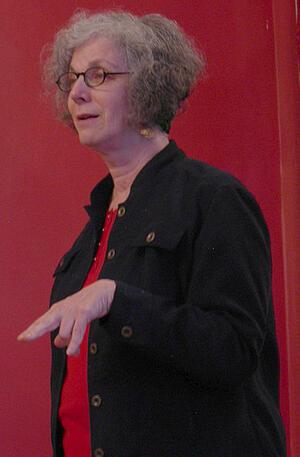Diane Balser
Born in New York City in 1943, Diane Balser attended a progressive summer camp when she was fourteen. Inspired by the songs and activities of peace and labor movements, the summer of 1958 left a lasting impression. A pioneering leader in the women’s movement, Diane helped to found Bread and Roses, one of the first feminist collectives in the country. Throughout the 1980s, Diane developed and led the largest network of individuals in Massachusetts representing women and public policy issues. Diane has also trained women worldwide for over 25 years in leadership skills, personal empowerment, and public policy. In 2002, Diane became involved with Brit Tzedek v’ Shalom - Jewish Alliance for Justice and Peace, an organization dedicated to achieving a negotiated settlement to the Israeli-Palestinian conflict. Diane quickly moved from co-chair of the Boston chapter to national Vice President and national co-chair of advocacy. In the fall of 2005, she became the acting CEO. In discussing Brit Tzedek, Diane notes the success of being able to build a grassroots, national organization dedicated to a two-state solution.” When the peace negotiations went terribly, there wasn’t an organized base of people in Israel, Palestine, or the United States who found a way to put pressure on their governments to continue.” However, through Brit Tzedek, that organized base has developed into over 23,000 members and supporters across the country. A dedicated activist for over 40 years on issues from civil rights to the Middle East, Diane insists, “We must move forward.”
Julie Johnson interviewed Diane Balser in Cambridge, Massachusetts, as part of the Women Who Dared project. Basler talks about her early path to activism, getting involved in peace activism as a youth, and attending a left-wing summer camp run by former communists when she was fourteen. Diane reflects on her involvement in the Women’s Movement, Brit Tzedek v’Shalom (also known as Jewish Alliance for Justice and Peace), and her role models. Balser discusses her teaching experience as a professor in the Women’s Studies department at Boston University and her discussions with students on various topics, such as antisemitism and feminism. Balser talks about the efforts of the international women’s movement and attending international women’s conferences, where she engages in conversations about gender, war and peace, race, and economics. In 1985, Balser visited Nairobi on behalf of the New Jewish Agenda to facilitate discussions about the Israeli–Palestinian conflict and helping raise awareness on issues of gender inequality globally. Finally, Balser reflects on the relationship between Jewish women and women of color.



